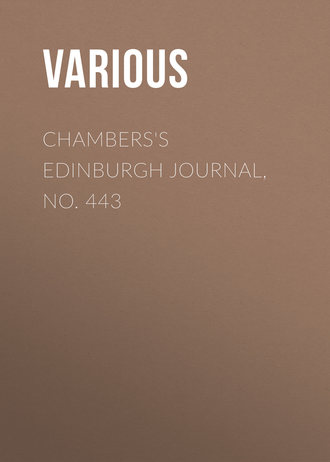
Various
Chambers's Edinburgh Journal, No. 443
NATIVITY AND PARENTAGE OF MARSHAL MACDONALD, DUKE OF TARENTUM
M. de Lamartine having made a mistake in his History of the Restoration, in describing Marshal Macdonald as of Irish extraction, it may be worth while to state what really was the parentage of that highly respectable man.
When Prince Charles Stuart had to voyage in an open boat from the isle of South Uist in the Hebrides to Skye, he was guided and protected, as is well known, by Miss Flora Macdonald. On that occasion, Flora had for her attendant a man called Neil Macdonald, but more familiarly Neil Macechan, who is described in the History of the Rebellion as a 'sort of preceptor in the Clanranald family.' This was the father of Marshal Macdonald. He remained more or less attached to the fugitive prince during the remainder of his wanderings in the Highlands, and afterwards joined him in France, under the influence of an unconquerable affection for his person. It was thus that his son came to be born abroad.
Neil Macdonald, though a man of humble rank, had received the education proper for a priest at the Scots College in Paris. His acquaintance with the French language had enabled him to be of considerable service to Prince Charles, when he wished to converse about matters of importance without taking the other people about him into his confidence. There is some reason to believe, that he wrote, or at least gave the information required for, a small novel descriptive of the poor Chevalier's wanderings, entitled Ascanius, or the Young Adventurer. (Cooper, London, 1746.)
When Marshal Macdonald visited Scotland in 1825, he made his way to the farm of Howbeg, in South Uist, where his father had been born, and where his ancestors had lived for many generations. He found here an old lady and her brother, his cousins at one remove, to whom he shewed great kindness, settling a pension at the same time upon a more distant relation whom he found in poverty. When about to leave the spot, he took up some of the soil, and also a few pebbles, which he got packed up in separate parcels, and carried back with him to France.
The facts respecting Marshal Macdonald's parentage were lately communicated to M. de Lamartine, who promptly sent the following answer: 'J'ai reçu, avec reconnaissance, monsieur, vos intéressantes communications sur le Maréchal Macdonald, homme qui honore deux pays. J'en ferai usage l'année prochaine à l'époque des nouvelles éditions.'
DOMESTICATION OF WILD BEES
The following account of the process of transplanting bodily a tribe of wild bees, is given in the notes to The Tay, a descriptive poem of considerable merit by David Millar. (Perth, Richardson, 1830.) 'When the boy, whose hobby leads him in that direction, has found out a "byke," he marks the spot well, and returns in the evening, when all its inmates are housed for the night. Pushing a twig into the hole as far as it will go, in case he should lose it by the falling in of the rubbish, he commences digging freely till the hum of the hive is distinctly heard, when he proceeds more cautiously to work. By this time, the more adventurous of the bees come out to ascertain what is going on, and are caught as they make their appearance, and put into a bottle. When the nest is fully exposed, it is lifted carefully up, and placed, as it stood, in a box prepared for it, along with the captured bees. The lid being now closed, the whole is carried home, and placed in the spot assigned for it in the garden. Next morning, a hole in the side of the box is quietly opened, when one or two of the strangers soon make their appearance, wondering, evidently, where they are, but apparently resolved to make the most of their new circumstances. At last, they rise slowly on the wing, and buzz round and round their new habitation for some time, taking, no doubt, special note of its every peculiarity. The circle of observation is then gradually enlarged, till it is thirty or forty yards in circumference, when the earnest reconnoitrer disappears, to return again in a short time with something for the general good. The curious in those matters, by placing the grubs of all the different kinds in one box beside a hive in operation, will soon have a choice assortment of all descriptions, working as amicably together as if they were all of the same family.'
COPPER-PLATE ENGRAVINGS COPIED ON STONE
In No. 439 of this Journal, Lieutenant Hunt received the credit of inventing a process by which copper-plate engravings may be transferred to stone, and the copies from a single print thus multiplied indefinitely. A correspondent, however, makes us fear that Lieutenant Hunt may have been unacquainted with what others had done before him. The process, it is stated, is not at all new; although, so far as we have heard, it has never been applied to the transfer of complicated pictorial engravings.
SONNET:
ON MY LITTLE BOY'S FIRST TRYING TO SAY 'PA-PA.'
Marked day! on which the earliest dawn of speech
Glimmered, in trial of thy father's name!
Albeit the sound imperfect, yet the aim
Thrilled chords within me, deeper than the reach
Of music! Happy hearted, I did claim
The title which those silver tones assigned;
And in me leaped my spirit, as when first
The father's strange and wondering feeling came!
While this dear thought woke up within my mind,
Which careful memory in her folds has nursed:
'If thus to earthly parent's heart so dear
His child's first accents, though imperfect all—
Dear, too, to Father-God, when faint doth fall
His new-born's half-formed "Abba" on his ear!'
P.


